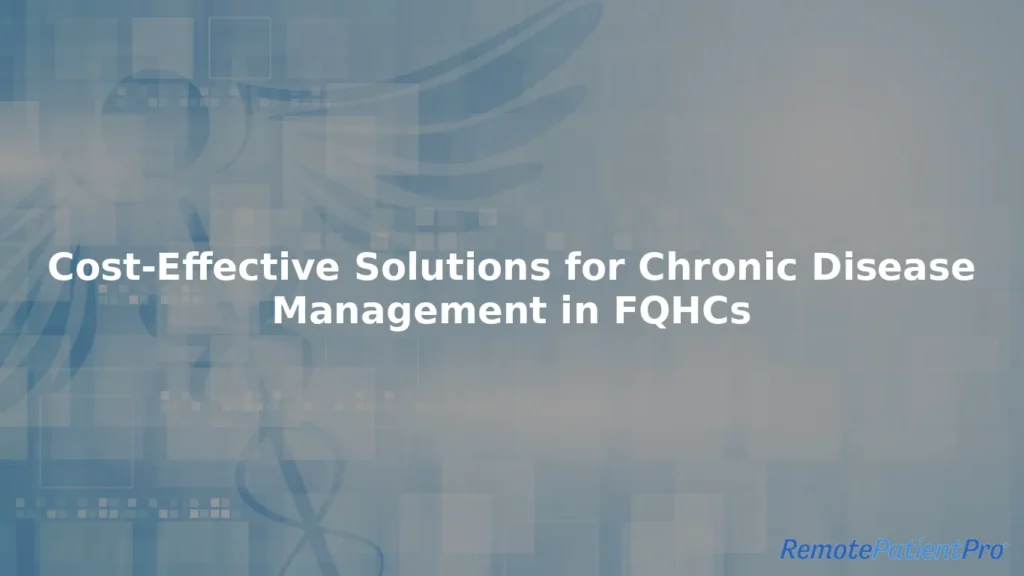Cost-Effective Solutions for Chronic Disease Management in FQHCs
Managing chronic diseases like diabetes, hypertension, and heart disease can be a challenge for Federally Qualified Health Centers (FQHCs). Many patients face barriers to care that then lead to poor health outcomes and costly hospitalizations. Finding cost-effective solutions for chronic disease management in FQHCs has become crucial, and remote patient monitoring (RPM) has demonstrated why it is one of them.
With RPM, FQHCs can get patients more involved in their own care, reduce emergency room visits, and substanially improve chronic disease outcomes — all without overburdening staff or available resources.
Challenges of Chronic Disease Management in FQHCs
FQHCs serve diverse, often underserved populations, which presents unique challenges, including:
- High patient volume with limited staff resources.
- Barriers to in-person visits due to transportation or financial constraints.
- Poor adoption of treatment plans, medication, and lifestyle changes.
- Increased risk of preventable hospital readmissions.
A cost-effective approach to chronic disease management requires scalable solutions that enhance care delivery without increasing operational costs.
Affordable Strategies for Managing Chronic Diseases
Implement Remote Patient Monitoring
RPM allows healthcare providers to remotely track patients’ vital signs and symptoms in real time, reducing unnecessary in-person visits while ensuring continuous care. Studies have shown that RPM programs reduce hospital readmissions and improve patient adherence to treatment plans.
Leverage Telehealth for Virtual Check-Ins
Virtual visits increase access to care for patients who struggle with available transportation. FQHCs can use telehealth to monitor symptoms, adjust medications, and provide lifestyle counseling without requiring in-person visits.
Optimize Care Coordination and Patient Education
Effective care coordination requires primary care providers, specialists, and social services to find better systems of working together to help patients suffering from chronic disease. Providing patient-friendly education materials and self-management tools can help those patients understand their symptoms, take more involved roles in managing their own health, and prevent further complications.
Utilize AI-Powered Decision Support Tools
AI-driven analytics can help FQHCs identify high-risk patients, predict disease progression, and customize care plans to avoid complications.
RemotePatientPro™: A Cost-Effective RPM Solution
Our remote patient monitoring platform offers an affordable and scalable solution designed to help FQHCs manage chronic diseases effectively.
- Real-Time Health Monitoring – It tracks key vitals, including blood pressure, glucose levels, and oxygen saturation.
- Seamless EHR Integration – It syncs with existing healthcare systems to streamline existing workflows.
- Automated Alerts for High-Risk Patients – It enables early detection of health changes so that providers can intervene sooner.
- User-Friendly, Cost-Effective Technology – It’s designed for FQHCs, rural clinics, and community health organizations to improve care without the financial strain.
The Financial Impact of Cost-Effective Chronic Disease Management
By implementing RPM and digital health solutions, FQHCs can achieve:
- Lower hospitalization rates due to early intervention.
- Increased medication adherence through remote monitoring.
- More efficient use of healthcare staff and resources by reducing unnecessary clinic visits.
Improve Chronic Disease Management at Your FQHC
By adopting cost-effective RPM and digital health solutions, FQHCs can deliver high-quality care, reduce costs, and improve long-term patient outcomes.
Looking for an affordable way to help your patients? Schedule a demo and explore how RPP’s RPM platform can benefit your team.

